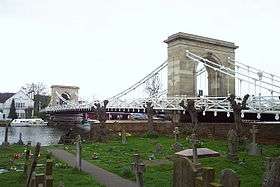Marlow Bridge
| Marlow Bridge | |
|---|---|
|
Marlow Bridge, from All Saints' parish churchyard | |
| Crosses | River Thames |
| Locale | Marlow |
| Heritage status | Grade I listed structure |
| Characteristics | |
| Design | Suspension |
| Height | 12 feet 8 inches (3.86 m)[1] |
| Longest span | 235 feet (72 m)[2] |
| History | |
| Designer | William Tierney Clark |
| Opened | 1832 |
Marlow Bridge is a road traffic and foot bridge over the River Thames in England between the town of Marlow, Buckinghamshire and the village of Bisham in Berkshire. It crosses the Thames just upstream of Marlow Lock, on the reach to Temple Lock.
There has been a bridge on the site since the reign of King Edward III which was stated in around 1530 to have been of timber, though an original crossing to the Knights Templar of Bisham may date from 1309.[3] In 1642 this bridge was partly destroyed by a Parliamentarian army. In 1789 a new timber bridge was built by public subscription with a contribution from the Thames Navigation Commission to increase the headroom underneath.[3]
The current suspension bridge was designed by William Tierney Clark and was built between 1829 and 1832, replacing a wooden bridge further downstream which collapsed in 1828.[2] [4] The Széchenyi Chain Bridge, spanning the River Danube in Budapest, was also designed by William Clark and it is a larger scale version of Marlow bridge.

In 1965 Marlow Bridge was faithfully restored.[5] It is a Grade I listed building.[5]
The bridge has a 3 tonne weight restriction and is used only by foot and local road traffic. Other traffic is carried by the Marlow By-pass Bridge.
On 24 September 2016 the bridge suffered 'potential structural damage' following an incident where a haulage lorry exceeding the weight limit attempted to pass over the bridge. The bridge was closed for the 'foreseeable future' in order to be structurally assessed.[6]
Engineers, commissioned by Buckinghamshire County Council, spent five weeks running a series of stress tests on the suspension bridge hangers and pins after the 37-tonne Lithuanian haulage lorry tried to cross it on 24 September 2016.
On 31 October 2016, having carried out ultrasound and magnetic particle tests above the road deck, Structural Engineers manoeuvred a river barge, with hydraulic hoist on board to allow ultrasound and magnetic particle tests to continue below the road deck.
The analysis report was due to be completed mid-November. Mark Shaw, Buckinghamshire County Council Cabinet Member for Transport, said that if the report recommended replacing sections of the bridge, specially manufactured parts could take up to 12 weeks to make and a further eight weeks to install. [7]
Buckinghamshire County Council announced on Wednesday, 16 November that the Structural Engineers' rigorous testing had found no significant damage to the suspension bridge and had given the all-clear to reopen the bridge. Mark Shaw announced that the bridge would reopen on Friday, 25 November following restoration of sections exposed for weld testing with three coats of paint, removal of scaffolding surrounding the bridge's two towers, and reinstatement of timber work removed for inspection. [8]
To the applause of around 100 onlookers, Marlow Bridge was reopened to traffic at 10am on Friday, 25 November, following a ribbon-cutting ceremony with Buckinghamshire County Council Chairman Val Letheren, Marlow Town Mayor Bob Johnson, Transport Cabinet Member Mark Shaw and local County Councillor Richard Scott. Val and Bob were first to drive across the reopened bridge following the ceremony. [9]
See also
References
- ↑ River Thames Alliance. Bridge heights on the River Thames.
- 1 2 "Marlow Suspension Bridge". Retrieved 11 December 2008.
- 1 2 Thacker, Fred S. (1968) [1920], The Thames Highway, 2, Locks and Weirs, Newton Abbot: David & Charles, p. 290
- ↑ Cove-Smith, Chris (2006). The River Thames Book. Imray Laurie Norie and Wilson. ISBN 0-85288-892-9.
- 1 2 Historic England. "Marlow Bridge, The Causeway (1332381)". National Heritage List for England. Retrieved 9 July 2015.
- ↑ http://tfblatestnews.blogspot.co.uk/2016/09/september-26th-marlow-bridge-closure.html
- ↑ http://www.buckscc.gov.uk/news/2016/october/inspection-barge-ordered-for-marlow-bridge-testing/
- ↑ http://www.buckscc.gov.uk/news/2016/november/marlow-bridge-to-reopen-(1)/
- ↑ http://www.buckscc.gov.uk/news/2016/november/marlow-bridge-reopens-with-a-civic-drive/
External links
![]() Media related to Marlow Bridge at Wikimedia Commons
Media related to Marlow Bridge at Wikimedia Commons
| Next bridge upstream | River Thames | Next bridge downstream |
| Temple Footbridge (pedestrian) |
Marlow Bridge Grid reference: SU851860 |
Marlow By-pass Bridge (road) |
Coordinates: 51°34′01″N 0°46′23″W / 51.567°N 0.773°W
